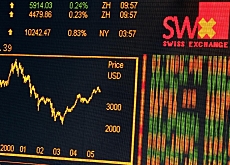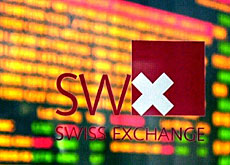Swiss bourse says “no plans for Alpine bunker”

Swiss stock exchange bosses, who last year turned down a German takeover bid, have rejected any comparison to failed national airline Swiss.
SWX Group chairman Reto Francioni said there was no plan to “retreat into an Alpine bunker”, but he saw little immediate prospect for stock exchange “consolidation”.
“For ten years now, everyone has been talking about stock exchange consolidation, but it has not happened,” Francioni told swissinfo at the SWX’s annual media conference on Tuesday.
Referring to last year’s takeover bid of the London Stock Exchange by Frankfurt’s Deutsche Börse and to a more recent merger attempt, Francioni said there was no generally valid successful model for the consolidation of stock exchanges and financial centres.
“Whether there ever will be will depend on whether the European stock exchange companies, after the experiences they have now had in the field, consider that consolidation is really a precondition for more efficient markets,” he added.
He said that, in addition to the complications posed by differing national regulatory systems, there would have to be a “concrete business case” for any individual merger proposal – and this had not yet been demonstrated.
Asked whether the SWX Group – like national airline Swiss – risked overestimating its capacity to “go it alone” in an increasingly competitive international marketplace, Francioni replied: “I would deliberately refrain from making any [such] comparison.
“This is not because of the result but because of the starting point, which is completely different.”
Alpine bunker?
He pointed out that the SWX Group’s primary goal was not to maximise profit, but to protect the overall interests of all members and participants, as well as those of the Swiss financial centre generally.
This clearly distinguishes it from Deutsche Börse, which is also a company quoted on the stock exchange.
An association of 55 banks – each of which has equal voting rights – owns the Swiss stock exchange indirectly.
In addition to the Swiss Exchange (SWX), it runs the pan-European Virt-x exchange – which allows major Swiss-listed companies to trade their shares in London – and the leading Eurex futures and derivatives exchange (jointly owned by Deutsche Börse).
However, Francioni said that going it alone was not the goal for SWX, but a means of reaching its own targets. “Independence for its own sake provides no added value,” he added.
The group was open to “cooperation possibilities” if and when they would add real value, and would carefully monitor “international developments” for any “suitable” opportunity.
With regard to last year’s unsuccessful approach by Deutsche Börse, Francioni said it had been rejected because the goal was not a cooperative venture, but a “complete takeover and integration” of the Swiss group into its German counterpart.
Heavyweight
Francioni pointed out that “foreign interest” in the Swiss exchange demonstrated not its weakness, but its strength as an international “heavyweight”.
The total market value of companies registered on the SWX was about SFr900 billion ($756 billion) – well over twice the value of Switzerland’s entire annual economic output.
The major Swiss multinationals alone represent no less than 14 per cent of the Dow Jones Eurostoxx 50 index – an index fund comprising Europe’s 50 largest companies.
Jürg Spillmann, head of the Group executive committee, added: “Many players involved in the Swiss financial marketplace are perhaps not aware that, in terms of healthcare companies, SWX occupies the number one slot in all Europe – ahead of the London Stock Exchange.”
Bonding
Heinrich Henckel, CEO of the SWX Swiss Exchange, confirmed that SWX plans to challenge London’s leading role in the huge international market for listing eurobonds – essentially, bonds issued by non-European companies for sale in Europe.
The London-based Financial Times newspaper wrote that the recent listing of a $125 million eurobond by Brazilian bank Itau marked the first time that Switzerland had snatched such business away from the “traditional” eurobond centres of London and Luxemburg.
It said the issue was “disproportionately significant” because it came at a time when new EU rules could discourage non-EU companies, particularly those listed in Asia, from issuing eurobonds inside the EU because of more stringent regulatory requirements.
Henckel declined to make any predictions of the Swiss group’s potential future share in the market, whose total size is valued at several hundred billion dollars.
However, he said the Swiss goal was to “build up SWX as an international competence centre for the listing, trading, clearing and settlement of SWX-listed international bonds”.
He added that success in this field would depend largely on “market developments” and on the reactions of the “relevant authorities” in the major EU capital markets.
swissinfo, Chris Lewis in Zurich
The SWX Group owns the SWX Swiss Exchange and the London-based Virt-x exchange, and co-owns the Eurex futures and derivatives exchange.
2004 revenue increased 4% to SFr358.8 million, and net profit rose 26% to SFr53.3 million.
Francioni said sound finances and technological innovation represented the basis for ongoing and independent development.
Francioni says there is still no valid and successful model for cross-border stock exchange mergers.
He says the SWX Group is strongly positioned to “go it alone”, but remains open to any proposition that would add “real value”.
He rejects any comparison with national airline Swiss, which turned down an initial German bid before finally saying yes.

In compliance with the JTI standards
More: SWI swissinfo.ch certified by the Journalism Trust Initiative


You can find an overview of ongoing debates with our journalists here. Please join us!
If you want to start a conversation about a topic raised in this article or want to report factual errors, email us at english@swissinfo.ch.